10 powerful films from TIFF 2017 that deserve an Oscar nod
With the Toronto International Film Festival drawing to a close on Sunday, the Oscar race is now officially underway. Here are some worthy contenders.
Share
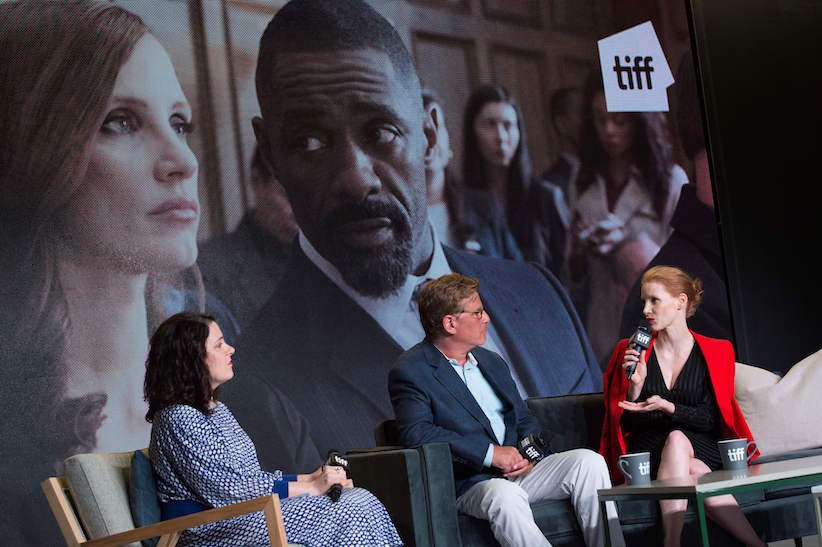
Too soon to think about the Academy Awards? Not for Hollywood. With the Toronto International Film Festival drawing to a close on Sunday, the Oscar race is now officially underway. Some contenders had already emerged from previous festivals—Sundance, Cannes, Venice, Telluride—but Toronto is the showcase where the majority were corralled in one vast window. And if the buzz is to be believed, prepare for the hashtag #oscarsowhitetrash. Some of the hottest films at TIFF were stories of scrappy renegade white women—from the vengeful mother played by Frances McDormand in Three Billboards Outside Ebbing, Missouri, which won the festival’s Grolsch People’s Choice Award, to figure skater Tonya Harding, played by Margot Robbie in I, Tonya, which was voted first runner-up. Meanwhile McDormand and Robbie can look for fierce competition from Jessica Chastain, cast as an underground poker queen who’s cornered by the FBI in Molly’s Game.
As for the guys, they were led by a spate of shameless anti-heroes—ranging from a preposterously bad movie director played by James Franco in The Disaster Artist to a debonair archeologist (Armie Hammer) who seduces a 17-year-old boy in the lush Tuscan reverie of Call Me By My Name (second runner-up for the People’s Choice Award). Even Darkest Hour‘s Gary Oldman—whose titanic portrayal of Winston Churchill made him the instant front-runner for best actor—plays England’s most iconic statesman as a shambling alcoholic. Competing with him in that category are two American actors cast as white working-class everymen: Stronger‘s Jake Gyllenhaal, who has heroism thrust upon him as Jeff Bauman, who lost both his legs in the Boston Marathon bombing; and Downsizing‘s Matt Damon, cast as a mild-mannered Middle American who tries to economize by joining a doomed utopia of volunteers who have been shrunk down to five inches. Make America Small Again.
I saw 46 of the 255 feature films presented at TIFF, and still missed a number of must-see titles. But among my favourites, here’s a top-10 list of films that should have a lasting impact. Movies that matter. I’ve omitted three gems that I already wrote about in Cannes, which could all hold their own at the top of this list: Russia’s Loveless, Sweden’s The Square—and French veteran Agnes Varda’s sublime Faces, Places, which beat out TIFF’s Tragically Hip odyssey, Long Time Running, for the People’s Choice documentary prize.
1. Three Billboards Outside Ebbing, Missouri
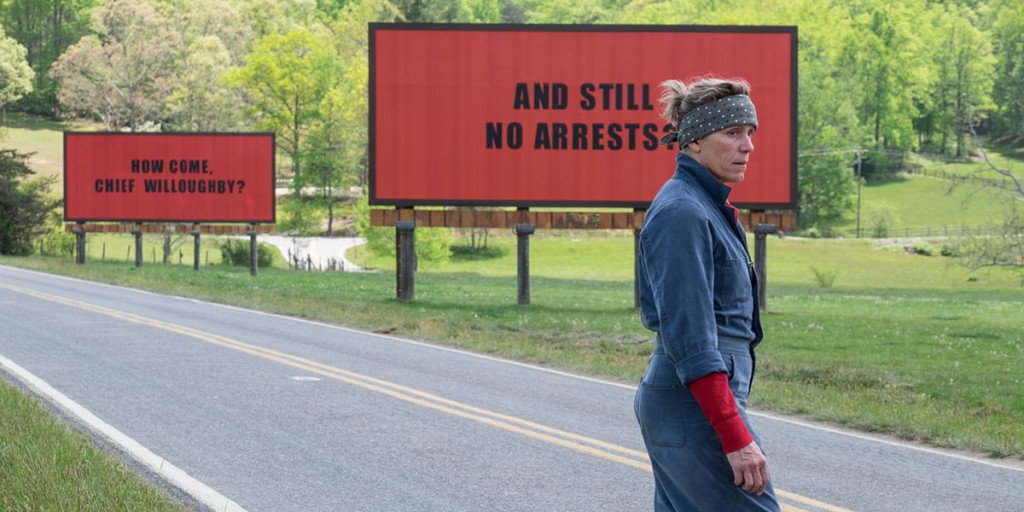
Two decades after she won her Oscar for Fargo, Frances McDormand is a leading contender once again with another comedy of violent errors set in small-town U.S.A. But this time she’s at war with the local police department, not in charge of it—as an embittered avenger named Mildred, who buys three billboards demanding the local sheriff (Woody Harrelson) re-open the cold case of her daughter’s horrific rape and murder. British writer-director Martin McDonagh has shown his flair for dark, quirky comedy with In Bruges and Seven Psychopaths, but here he takes it to a whole new level. Shape-shifting between comedy and drama, the story surprises us at every turn, and so do the characters. Sam Rockwell is brilliant in the role of a bone-headed deputy sheriff who undergoes a jaw-dropping transformation. And the film’s alchemy, which mixes brutal cynicism and tender emotion, is unlike anything I’ve seen before.
2. I, Tonya
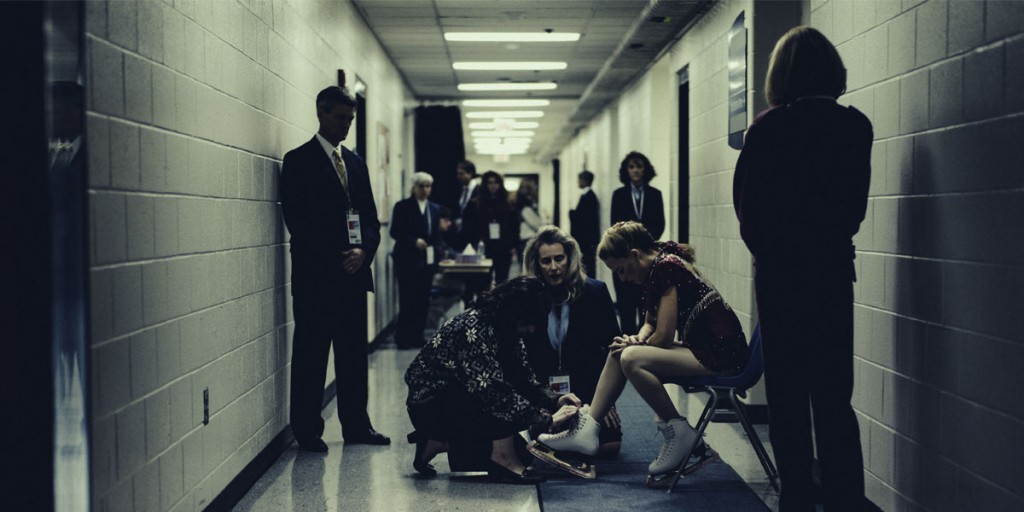
Of TIFF’s three period films about sports icons—the other two are play-it-safe tennis movies, Borg McEnroe and Battle of the Sexes—I, Tonya skated deliriously out of bounds. For a movie many were prepared to hate, it’s the year’s most unlikely crowd-pleaser. A de-glamorized Margot Robbie suspends disbelief by putting a triple-axel spin on an iconic villain, generating credible empathy for Tonya Harding as a seriously talented athlete abused by both her idiot husband and the rigged racket of figure skating. Based on interviews with Harding and her deluded posse, the film doesn’t let her off the hook, but awards her a partial redemption—suggesting she at least wasn’t in on the plot to kneecap Nancy Kerrigan. Robbie may be too green to rate a Best Actress nod, but Allison Janney is a shoe-in for her supporting role as Tonya’s foul-mouthed, chain-smoking stage mother from hell. And Craig Gillespie directs with Olympic virtuosity: uncut shots of Robbie skating up a storm make you wonder how on earth they pulled it off.
3. The Rider
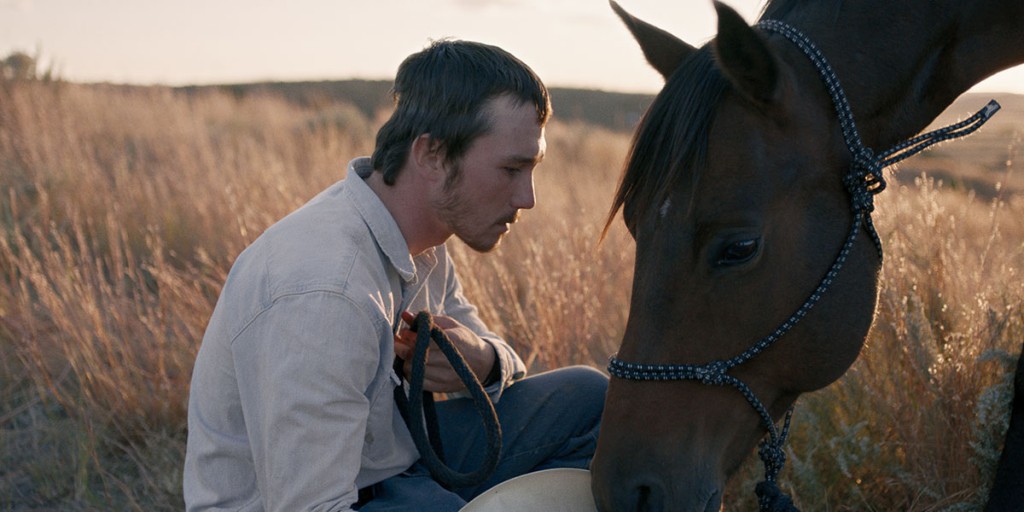
With a film that rides an invisible line between drama and documentary, Beijing-born director Chloé Zhao opens up a new frontier for our romance with the cowboy. Real-life wrangler Brady Jadreau stars in a version of his own story, as a rodeo champion who is thrown out of work by a near-fatal head injury. In fact, the film’s entire cast play versions of themselves, with only their last names changed. This is a movie that is literally about getting back on the horse. But in Brady’s case, that proves to be an impossibly dumb ambition, so he settles for a job in a supermarket, then finds work as a horse trainer—while caring for his mentally challenged teenage sister, feuding with a father who has a gambling problem, and cheering on a quadriplegic buddy paralyzed by a bull-riding accident. As grim as all that may sound, The Rider is a thing of exquisite beauty. It’s strangely rewarding to watch a movie with two winning characters who are mentally challenged. The real-time sequences of Brady coaxing trust from unbroken horses cast an extraordinary spell. And between the rhapsodic landscapes and the spare dialogue, Zhao grounds the Zen-like myth of cowboy culture in a rare authenticity.
4. Molly’s Game
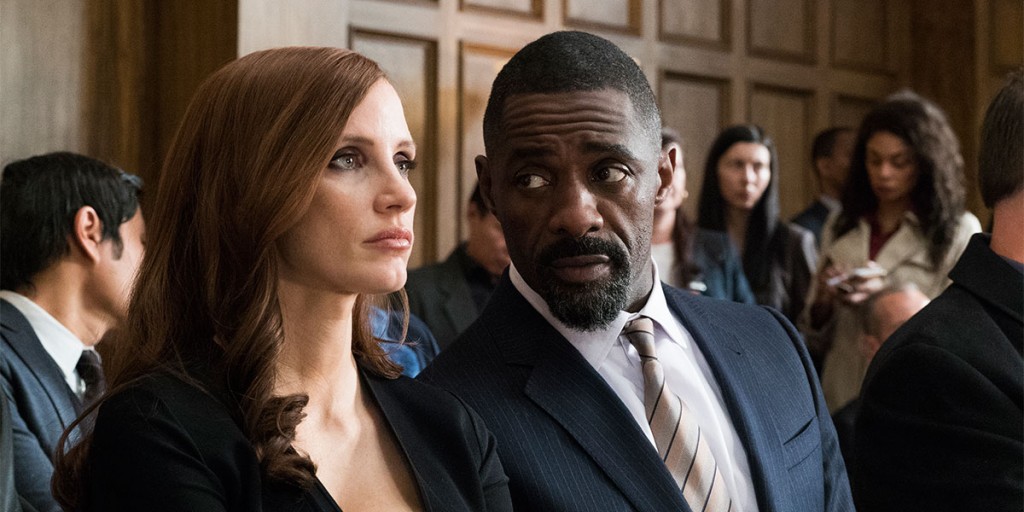
From The West Wing to The Social Network, Academy Award-winning screenwriter Aaron Sorkin has become famous for scripting rapid-fire volleys of dense, sharply written dialogue. Now with his directing debut, he compliments that amphetamine energy with a kinetic visual style that could be modelled on Scorsese. With a running time of almost two hours and 20 minutes, the pace gets exhausting—not unlike the all-night poker marathons at the heart of the film. But Molly’s Game illuminates a true story in fascinating detail. And throughout this epic tale, Jessica Chastain sustains an incendiary performance as Molly Bloom, who ends up running one of the world’s biggest underground poker games after an accident ends her career as an Olympic-class skier. Like Bloom, Sorkin doesn’t know when to stop: he seems compelled to give each of his stars, from Idris Elba to Kevin Costner, a momentous speech that screams “Oscar!” But in Chastain’s case, a nomination would be well-deserved.
5. The Florida Project
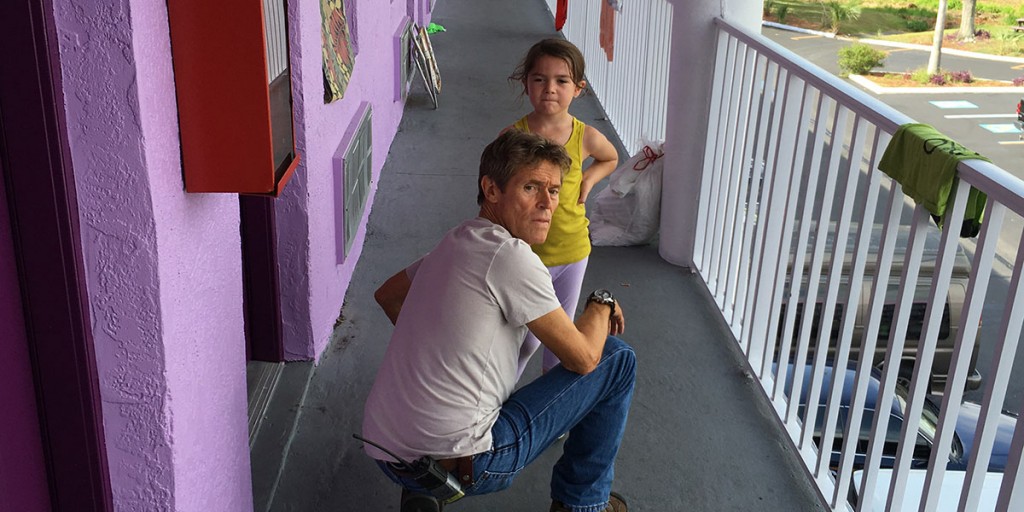
In this follow up to Tangerine—his tale of a transgender prostitute shot entirely on an iPhone—American director Sean Baker delivers another vérité portrait of life on the margins. But with The Florida Project, he went to the other technological extreme and shot on 35 mm film. The story is set in the outskirts of Orlando, in a cheap motel called the Magic Inn, a lavender-painted slum that mimics Disney’s cartoon fantasy but is worlds away from the nearby Magic Kingdom. The drama follows a cash-strapped single mom/ex-stripper (Bria Vinaite), who lets her precocious six-year-old daughter (Brooklynn Prince) run wild with the other motel kids, when not roping her into various scams. Both mother and daughter are played by actresses who had never made a film, and both give utterly natural performances—Baker recruited the child from an Orlando casting call, and discovered Vinaite on Instagram. (During TIFF she had a dinner date with Drake.) The film’s only star, Willem Dafoe, is richly cast against type as the motel’s benevolent, infinitely patient manager. Immersive and episodic, Baker’s narrative roams Orlando’s tacky landscape with such feral aimlessness you don’t see the story creeping up on you. When it hits, like a sudden thunderstorm after heat wave, the impact is astounding.
6. Lady Bird
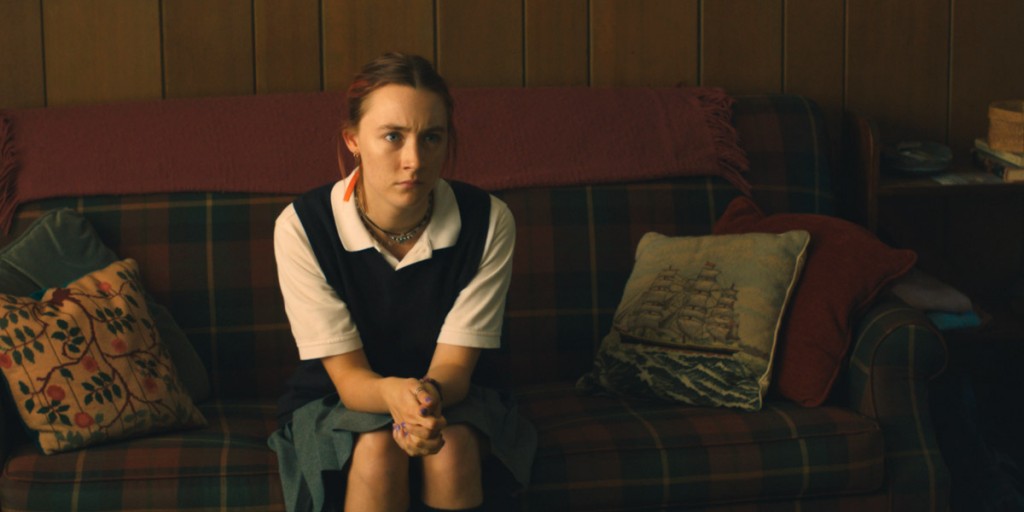
Greta Gerwig is known for playing neurotic women in films by her husband, Noah Baumbach, and co-wrote two of them with him (Francis Ha and Mistress America). But with Lady Bird she makes an impressive solo debut as a writer-director, while staying off camera. The title is misleading. This is not a movie about the wife of former U.S. president Lyndon Johnson. It’s about Christine (Saoirse Ronan), a high-school senior at a Roman Catholic school in Sacramento, whose rebellion against her parents includes rejecting her given name for Lady Bird. It also includes losing her virginity, ditching her best friend for the cool crowd, and leaving “soul-killing” Sacramento. Gerwig grew up there, and attended a Catholic school, so while the story ticks off the coming-of-age tropes, it’s rooted in memoir and has the ring of truth. Meanwhile, Gerwig deftly compresses her story into montage-like bursts of narrative that never seem superficially stylish, but convey novelistic depths of emotional detail.
7. The Shape of Water
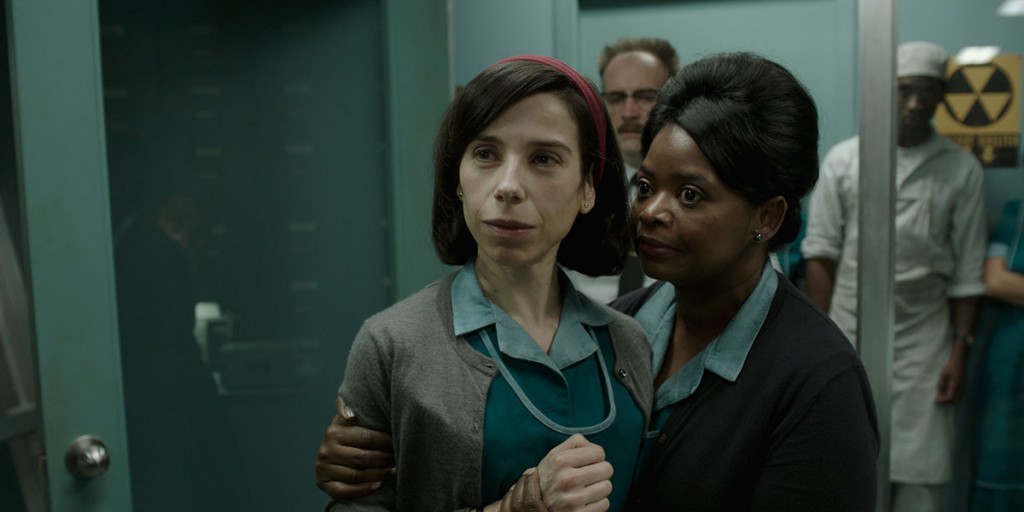
Mexican filmmaker Guillermo Del Toro, who now lives in Toronto, has had mixed success since his Oscar nomination for Pan’s Labyrinth (2006). But after the blockbuster overkill of Pacific Rim and the overripe Gothic horror of Crimson Peak, with The Shape of Water, the king of genre geeks has made a remarkably tasteful and downright gorgeous romantic fable that the Academy can not only stomach but celebrate. Set in Cold War 1963, The Shape of Water is an adult fairy tale about a shy janitor (Sally Hawkins) who falls in love with a scaly, amphibious creature caged in a secret government laboratory. With her eccentric neighbour (Richard Jenkins) and her plucky co-worker (Octavia Spencer), she conspires to free this erotic monster from the clutches of a sinister federal agent (Michael Shannon). Despite a trite ending, The Shape of Water unfolds as a shimmering ode to classic cinema, brought home by the fact that our heroine lives above a vintage movie house—a set provided by Toronto’s Elgin theatre.
8. A Fantastic Woman
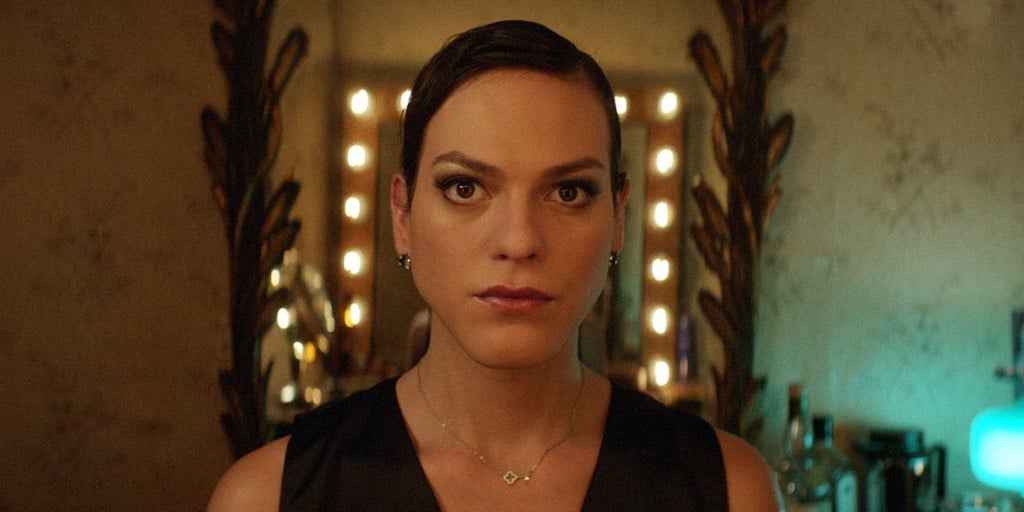
This ground-breaking drama from Chilean director Sebastián Lelio (Gloria) presents a spellbinding portrait of a young transgender woman named Marina (Daniela Vega), who undergoes a gauntlet of recrimination and prejudice after her lover, a 57-year-old divorced man, dies after waking up beside her with an aneurism, and sustains injuries in a fall down the stairs that makes her a target of suspicion. Barred from his funeral and tormented by the man’s ex-wife, their son, and the police investigator, Marina is cast as a femme fatale. How she manages to extract her dignity from the ordeal is extraordinary. And as Vega’s gaze transfixes the camera with smouldering resolve, you can’t take your eyes off her. She has the timeless and unplaceable beauty of a vintage movie star.
9. Darkest Hour
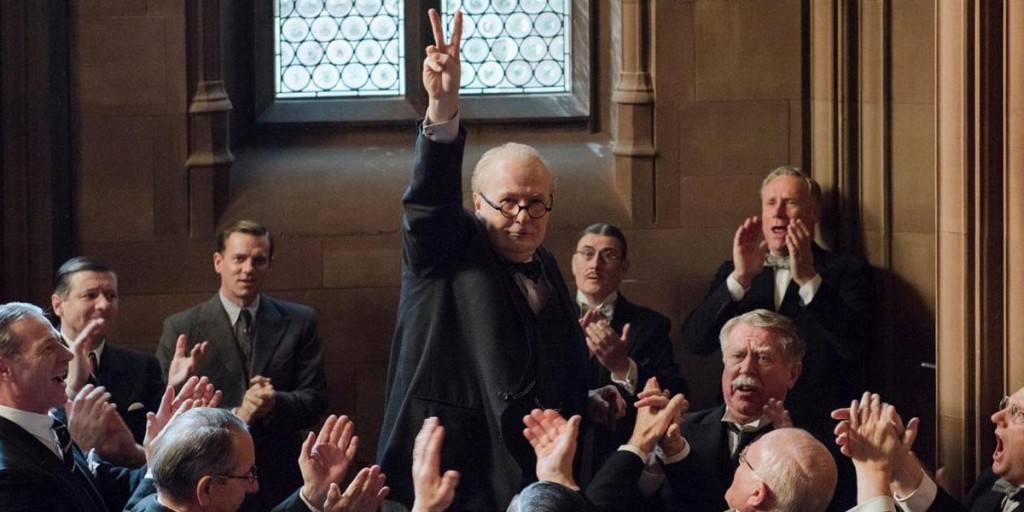
Landing with remarkable timing, it’s the perfect companion piece to Dunkirk. While Christopher Nolan’s movie presents the outdoor spectacle of evacuating British troops from Dunkirk’s beach in 1940, Darkest Hour tells the backstage story of Winston Churchill clinging to power as the new prime minister, and vowing to fight the Nazis rather than sue for peace. Joe Wright (Atonement) directs this House of Cards intrigue with a visual bombast that threatens to upstage his hero’s own theatricality. But the one reason to see the movie is Gary Oldman, whose embodies Churchill in a staggering performance, one that ranges from the mumbled nuance of a dithering alcoholic to the towering rhetoric of a supernatural statesman. At one point a rival politician grimly observes that Churchill “mobilized the English language and sent it into battle.” That’s exactly what Oldman does—a great actor portraying a great actor.
10. Long Time Running
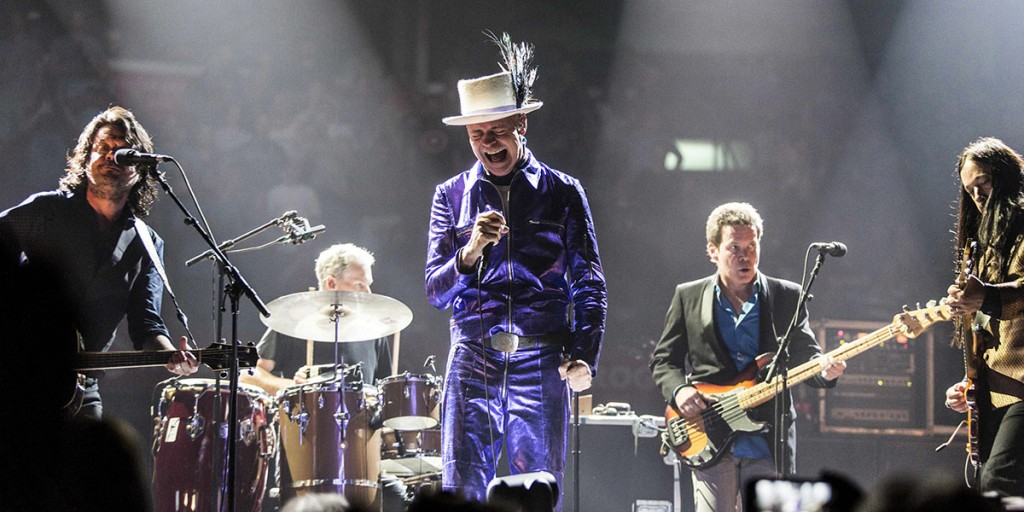
It’s a Canadian film that’s likely not in the running for an Oscar. Though you have to wonder if this sad and magnificent documentary about the Tragically Hip’s final tour might not find the international audience that eluded the band in a career that spanned three decades. You don’t have to be a fan, or a Canadian, to appreciate the universal power of this story, which transcends national boundaries—a beloved rock star receives a terminal cancer diagnosis, has much of his brain removed, loses his memory, then fights back to lead a national tour that turns into the biggest pop culture phenomenon his country has ever seen. Co-directors Jennifer Baichwal and Nicholas De Pencier, do a superb job of harnessing the Hip’s heroic odyssey in a suspenseful and moving narrative. In a story that could have been overwhelmed by Gord Downie tragic heroism, they take care to give his bandmates, and the audience, their due. And amid the mass adoration, they capture heart-breaking moments of intimacy—Downie sitting backstage in his underwear, polishing his black boots, a ritual inherited from his father, brushing them as if his life depended on it.
Some of my other TIFF favourites: Jane, Foxtrot, The Insult, Sweet Country, What Will People Say, Downsizing, Porcupine Lake.